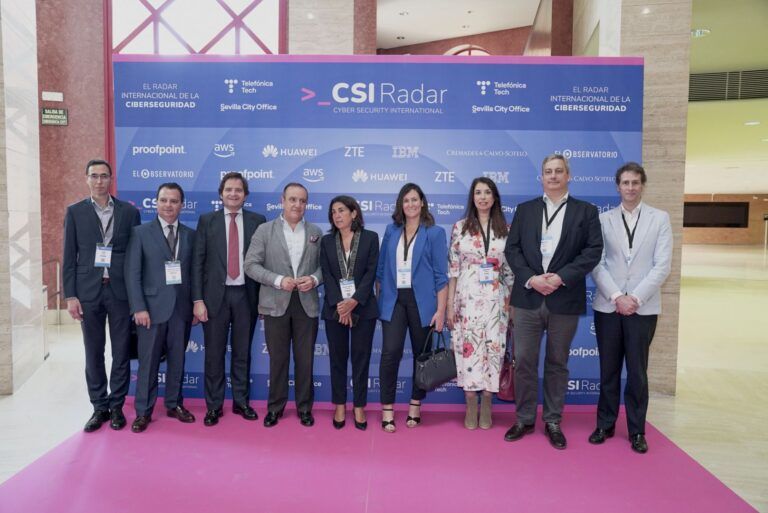- Isabel Tristán, Directora de Ventas de Software de Seguridad de IBM afirma que “la ciberseguridad tradicional ha quedado obsoleta” y aboga por elevar la figura “del analista de ciberseguridad y facilitar su trabajo”.
- Pedro Álamo, Senior Account Manager Public Sector de Proofpoint: “El 97% de las brechas de ataque hacia los usuarios son a través del correo electrónico”.
- Mañana, 13 de junio en Fibes, el evento contará con la participación de INCIBE, CCI, Telefónica Tech, Policía Nacional, Guardia Civil y la Agencia Digital de Andalucía.
The afternoon session of the opening day of ‘CSI Radar‘ was attended by large multinationals from the United States and China. On the US side, IBM participated with Isabel Tristán, Director of Security Software Sales; Proofpoint with Pedro Álamo, Senior Account Manager Public Sector; and AWS through Jesús Rodríguez, CyberSecurity Sales Specialist-Iberia. China was represented by Huawei with José Capote, Cyber Security And Privacy Officer; and by ZTE with Antonio Relvas, Director of Cybersecurity Strategy.
The highlight of the afternoon came with the presence of Isabel Tristán, Director of Security Software Sales at IBM, who spoke about the way in which companies must be able to react more in advance to possible attacks. “Cybercriminals have evolved and are able to deploy ransomware attacks in less than three days, while the average time for companies is 7 months to detect an incident and 2 months to react to one of those incidents.”

“It is clear that traditional cybersecurity, i.e., that focused on proprietary technologies and systems, has become obsolete.” Given this situation, IBM has a clear vision in this regard, and it is none other than “elevating the cybersecurity analyst and facilitating their work with the different cybersecurity solutions in each organization.” In this role, embedded Artificial Intelligence allows “to perform automatic investigations to be consumed by the analyst and thus reduce the average investigation time from 2 days to less than 30 minutes,” said Tristán.
“It’s in your hands not to be supplanted”.
For his part, Pedro Álamo, Senior Account Manager Public Sector at Proofpoint, highlighted email as the main vector to protect both organizations and individuals, since “97% of attack breaches against users are through email”. “It is in your hands not to be supplanted,” said Álamo, who brought to the table the concept of ‘happy clickers’, i.e. that “incontinent user, who clicks on any link that arrives” and which should be eradicated. “The solution for email protection lies in three aspects: prevention, detection and response.

Jesús Rodríguez, Cybersecurity Sales Specialist-Iberia at AWS, and Arancha Jiménez, Head of Cybersecurity, Services and Product at Eviden, addressed the risks in public cloud platforms and the importance of security in this area. “AWS works so that customers always have control, what is called data and application sovereignty. That is, knowing where their data is and who can manage it,” said Rodriguez. The AWS representative advocates “a public cloud service that is as secure as possible”.

The head of cybersecurity at Eviden, an AWS partner, has advocated “prevention, protection and preservation of end-to-end security” to achieve high security in the cloud.
“Network boundaries are becoming more complex to defend”.
José Capote, Cyber Security And Privacy Officer at Huawei, spoke about security management in the 5G era in which “network boundaries are blurring and becoming more complex to defend.” “Threats that were traditional are now appearing in communication networks, the solution being in a shared responsibility model with different providers offering capabilities at the top level.”

“Cybersecurity is a multi-layered, shared security model. The importance of standardization and investment in R&D to offer extra control are fundamental in an increasingly complex industrial environment,” said José Capote.
“5G in cybersecurity is already a reality”.
Finally, Antonio Relvas, Director of Cybersecurity Strategy at ZTE, discussed security in 5G networks, which he considers a product of the future that is already perfectly integrated into the present: “5G, like all products, has problems that have to be verified under international standards. It is certainly good for fighting against cyber-attacks and will be more secure than 4G. It is a solution that is already a reality,” he said.

Companies such as Telefónica Tech, Tesla, ZTE, AWS, Proofpoint and ‘El Observatorio’ were present in the area set aside for demonstrations at the Palacio de Congresos y Exposiciones. Tesla has allowed attendees to test several late-model smart cars in a closed driving circuit. For its part, ZTE has shown professionals different cutting-edge practices carried out in the laboratories. In addition, AWS has a suitcase carrier that prevents cyber-attacks, used in the conflict in Ukraine. Tomorrow, Tuesday, this demonstration area will also be available.
All the conferences of this day and those of the whole event can be followed through ‘The Observatory‘, a platform launched by Medina Media Events. This first edition of ‘CSI Radar’ is promoted by Telefónica Tech, Sevilla City Office and FIBES, and has the support of AWS, Proofpoint, Huawei, ZTE, IBM, Cremades & Calvo-Sotelo and ‘El Observatorio’.
Tomorrow Tuesday’s in-person session will start at 10 am at FIBES and will feature presentations by Luis Hidalgo from Incibe, Juan Miguel Pulpillo from ITC, Sergio de los Santos from Telefónica Tech, Juan Salom from the Guardia Civil, José Girón from the National Police and Eloy Sanz from the Digital Agency of Andalusia.

